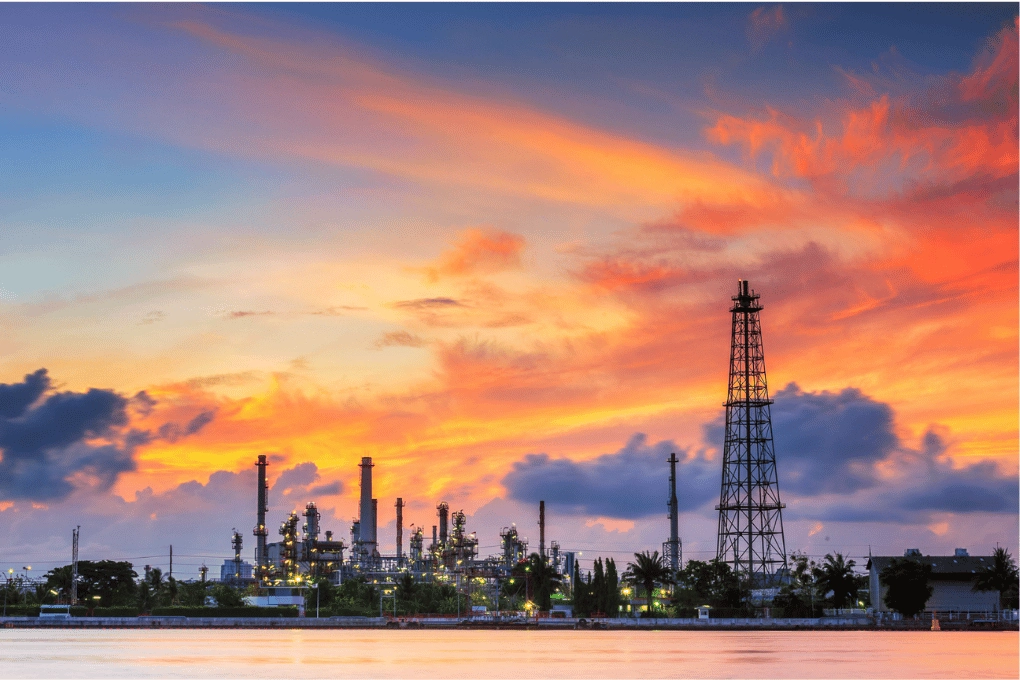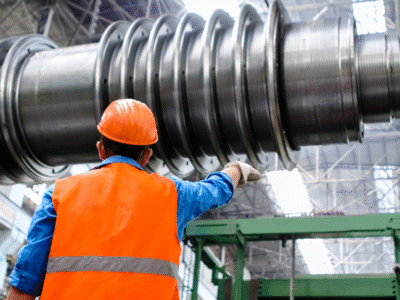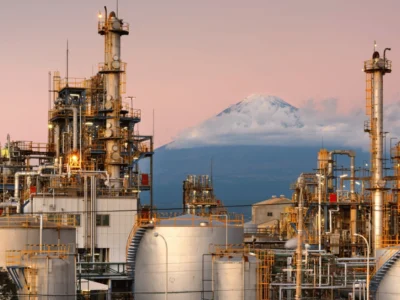This course delivers a comprehensive and structured approach to oil refining, petrochemical production, and fertilizer manufacturing, covering 87 specialized modules. It provides an in-depth understanding of refining processes, catalysts, conversion technologies, and advanced treatment methods essential for improving product quality and operational efficiency.
Participants will explore distillation, hydrocracking, catalytic reforming, gas treating, and blending technologies, along with troubleshooting techniques for refinery operations. The program also emphasizes fertilizer production processes, petrochemical integration, equipment maintenance, and safety systems, ensuring a well-rounded technical foundation.
In addition to process technologies, the course covers hazard identification, risk assessment, environmental regulations, and operational safety, equipping professionals with the skills needed to enhance efficiency, reduce losses, and maintain compliance with industry standards.
By the end of the program, participants will gain technical expertise and practical insights to optimize refinery, petrochemical, and fertilizer operations, improve process reliability, and ensure safe plant management.
Course Features
- Lectures 87
- Quiz 0
- Duration 25 hours
- Skill level All levels
- Language English
- Students 1
- Certificate No
- Assessments Yes
- 1 Section
- 87 Lessons
- 25 Hours
- Course Module:87
- 1.1Fundamentals of Oil Refining Technology
- 1.2Distillation Processes, Calculations, and Multivariable Process Control
- 1.3Advanced Conversion Processing & Advanced Oil Refining Technology
- 1.4Fundamentals of Catalysts in the Oil & Gas Industry (Evaluation, Operation, Regeneration, etc.)
- 1.5Continuous Catalyst Regeneration (CCR)
- 1.6MEROX Processes
- 1.7Hydro-Treating Processes Technology
- 1.8Gas and Liquid Driers Operation, Design, Logic, and Calculation
- 1.9Naphtha Hydro-Treatment (HDS & NHT)
- 1.10Catalytic Reforming (CRU)
- 1.11Catalytic Reforming: Modern Plat-Forming Process with Continuous Catalyst Regeneration (CCR)
- 1.12Blending Operations and Optimization
- 1.13Operations & Troubleshooting of Refinery Facilities
- 1.14Chemical Engineering for Non-Chemical Engineers
- 1.15PENEX Isomerization Process
- 1.16Kerosene MEROX
- 1.17LPG MEROX
- 1.18Sour Water Stripping and Amines Regeneration System
- 1.19LPG & Sour Gases Sweetening Amine Process & Regeneration System
- 1.20Hydrocracker Technology
- 1.21Crude Atmospheric and Vacuum Distillation
- 1.22Process Safety and Hazard Analysis (PHA & HAZOP)
- 1.23Process Operations & Troubleshooting for Technicians
- 1.24Pumps – Centrifugal & Positive Displacement (Installation, Operation, Maintenance, and Troubleshooting)
- 1.25Refinery Process Units & Equipment Troubleshooting
- 1.26Hydrocarbon Storage, Shipping, and Utilization
- 1.27Plant Operation and Troubleshooting
- 1.28Fundamentals of Process Calculations
- 1.29Process Calculation and Simulation using HYSYS
- 1.30Oily Water Treatment
- 1.31Crude Oil Desalting Operation, Design, and Troubleshooting
- 1.32Operations Accidents Investigations
- 1.33Incident Investigation & Accident Prevention in Refinery Process & Environmental Management
- 1.34Oil & Gas Industry for Administration Teams
- 1.35Refinery Process Operations
- 1.36Refinery Gas Treating, Sour Water, Sulfur & Tail Gas
- 1.37Refinery Cracking Technology
- 1.38Planned Shutdown and Critical Activities, Isolation, Startup & Commissioning
- 1.39Fundamentals of Equipment Selection & Sizing, Operation in the Oil & Gas Industry
- 1.40Refinery-Petrochemical Integration & Economics
- 1.41Overview of Oil, Gas & Petrochemicals Industry
- 1.42Methods & Techniques for Crude Oil Evaluation
- 1.43Modern Refinery Technology
- 1.44Oil & Gas Operational Safety
- 1.45Hydrocarbon Losses in Oil and Gas Industry
- 1.46Flare & Valuable Gases Recovery System
- 1.47Petroleum Refinery for Non-Technical Professionals
- 1.48Understanding Success Factors in the Petrochemicals Industry
- 1.49Troubleshooting in Refinery Process Equipment
- 1.50Tank Farm Off-Site & Oil Movement
- 1.51Tank & Tank Farms Design, Operations, Instrumentation, Inspection & Maintenance
- 1.52Hydrocarbon and Sour Gases MEROX Process
- 1.53LPG Production Technology & Gasoline Stabilization
- 1.54HAZOP Applications in Petroleum Industry (LEVEL I)
- 1.55HAZOP Applications in Petroleum Industry (LEVEL I)
- 1.56HAZOP Applications in Petroleum Industry (LEVEL II)
- 1.57Basics of Petrochemicals Industry
- 1.58Basics of Fertilizers Industry
- 1.59Gasoline Production and Quality Improvement Technology
- 1.60Pollution Prevention and Cleaner Production for Oil and Gas Industry
- 1.61Petroleum Products Specifications
- 1.62Emergency and Process Shutdown (ESD & PSD)
- 1.63Tower Internals
- 1.64Oil Movement, Storage & Troubleshooting in Modern Refineries, Marine Terminals & Oil Plants
- 1.65Fundamentals of Ethylene & Propylene, Polypropylene and Polyethylene Industry
- 1.66Petroleum Oil and Gas Wastes & Disposal
- 1.67Process Safety Engineering and LOPA Analysis
- 1.68LPG Production Technology (MEROX, Gasoline Stabilization, Processing & Conditioning, Startup & Shutdown)
- 1.69Process Plant Design, Calculation & Life Simulation using SEMTRONIX
- 1.70Process Panel Operator Assessment (DCS Operations, Process Control Fundamentals, and Life Simulator Usage)
- 1.71Plant Monitoring & Optimization
- 1.72Engineering Design for Process Safety
- 1.73Planning & Economics for Refinery Operations
- 1.74Hydrogen Sulfide (H₂S) Gas Awareness Program
- 1.75Introduction to Petrochemicals
- 1.76LPG Engineering Course
- 1.77Modern Valve Technology
- 1.78LPG Design & Installation of Systems
- 1.79Quality Control in Oil and Gas Production
- 1.80Oil and Gas Operations: Environmental Concerns and Solutions
- 1.81Steam Turbines Operation & Troubleshooting
- 1.82Process Engineering for Non-Process Engineering Professionals
- 1.83Managing Shutdowns, Turnarounds, and Outages
- 1.84Crude Distillation Tower Operations
- 1.85Emergency Handling in the Refinery Industry
- 1.86International Oil Supply, Transportation, Refining & Trade
- 1.87International Oil Supply, Transportation, Refining & Trade
Target audiences
- 1. Process Engineers: responsible for optimizing refining, petrochemical, and fertilizer production units.
- 2. Production Engineers: overseeing plant operations, troubleshooting, and performance improvement.
- 3. Operations and Plant Managers: leading refinery, petrochemical, and fertilizer plant teams.
- 4. Technical Supervisors: ensuring process efficiency, quality control, and equipment reliability.
- 5. DCS Panel Operators: monitoring and controlling production units in refining and petrochemical plants.
- 6. Maintenance and Reliability Engineers: handling equipment upkeep, system integrity, and troubleshooting.
- 7. HSE Specialists: managing process safety, hazard analysis, and environmental compliance.
- 8. Quality Control and Laboratory Staff: responsible for monitoring product specifications and refining efficiency.






